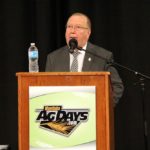
Lower crop insurance premiums, in 2018
The pre-harvest deductible on corn and soybeans is ending and CHNR wheat gets its own category

How to grow 70 bushel canola
Manitoba Ag Days speaker has a tip for growers looking to get the most out of their canola yields.

Monsanto highlights research pipeline for canola, soybeans
Xtend soybeans with added glufosinate tolerance isn’t far off, but glyphosate- and dicamba-tolerant canola is still five or six years out

MacAulay takes case for NAFTA to U.S. farmers
He’s the first Canadian minister to speak to the nearly 100-year-old organization

Better trade deals coming for U.S. farmers, Trump says

Canola dockage tips from CGC grading school
During the dockage assessment process canola should be cleaned so farmers get the best possible grade

Subjective? Not exactly
Western Canada’s wheat-grading system is probably more objective than you think

Falling number, objective grain-grading debate not new
The grain industry explored machine testing more than a decade ago

Grain shippers in between legislation as rail service declines
The Fair Rail for Farmers Act is dead and the Transportation Modernization Act hasn’t become law

NAFTA ag deal while keeping supply management possible
Mike Gifford says the negotiations are unique because agriculture doesn’t top the agenda






